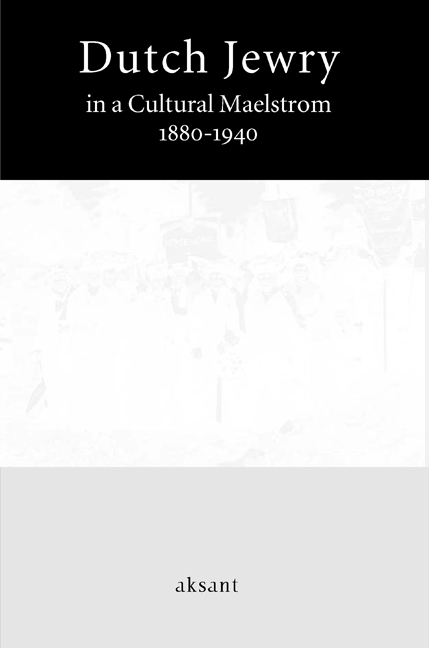Book contents
- Frontmatter
- Contents
- Foreword
- The New “Mosaik”: Jews and European Culture, 1750-1940
- The Politics of Jewish Historiography
- “The First Shall be the Last”: The Rise and Development of Modern Jewish Historiography in the Netherlands Until 1940
- Epigones and Identity: Jewish Scholarship in the Netherlands, 1850-1940
- Judaism on Display: The Origins of Amsterdam's Jewish Historical Museum
- De Vrijdagavond as a Mirror of Dutch Jewry in the Interbellum, 1924-1932
- “Holland is a Country which Provokes Serious Reflection…”: Images of Dutch Jewry in the German Jewish Press
- Spinozism and Dutch Jewry between 1880 and 1940
- Spinoza's Popularity in Perspective: A Dutch-German Comparison
- Mozes Salomon Polak: Jewish “Lerner” and Propagator of Freemasonry, Spiritualism, and Theosophy
- Jewish Women, Philanthropy, and Modernization: The Changing Roles of Jewish Women in Modern Europe, 1850-1939
- Roosje Vos, Sani Prijes, Alida de Jong, and the others: Jewish Women Workers and the Labor Movement as a Vehicle on the Road to Modernity
- Stemming the Current: Dutch Jewish Women and the First Feminist Movement
- Dutch Jewish Women: Integration and Modernity
- Index of Names of Persons
- Index of Subjects
Dutch Jewish Women: Integration and Modernity
Published online by Cambridge University Press: 26 January 2021
- Frontmatter
- Contents
- Foreword
- The New “Mosaik”: Jews and European Culture, 1750-1940
- The Politics of Jewish Historiography
- “The First Shall be the Last”: The Rise and Development of Modern Jewish Historiography in the Netherlands Until 1940
- Epigones and Identity: Jewish Scholarship in the Netherlands, 1850-1940
- Judaism on Display: The Origins of Amsterdam's Jewish Historical Museum
- De Vrijdagavond as a Mirror of Dutch Jewry in the Interbellum, 1924-1932
- “Holland is a Country which Provokes Serious Reflection…”: Images of Dutch Jewry in the German Jewish Press
- Spinozism and Dutch Jewry between 1880 and 1940
- Spinoza's Popularity in Perspective: A Dutch-German Comparison
- Mozes Salomon Polak: Jewish “Lerner” and Propagator of Freemasonry, Spiritualism, and Theosophy
- Jewish Women, Philanthropy, and Modernization: The Changing Roles of Jewish Women in Modern Europe, 1850-1939
- Roosje Vos, Sani Prijes, Alida de Jong, and the others: Jewish Women Workers and the Labor Movement as a Vehicle on the Road to Modernity
- Stemming the Current: Dutch Jewish Women and the First Feminist Movement
- Dutch Jewish Women: Integration and Modernity
- Index of Names of Persons
- Index of Subjects
Summary
Once there was a vision: the hope and conviction that Jews would integrate into Dutch society. This hope existed especially among the progressive Jews: intelligentsia, liberals, and socialists. In recent decades, historians advocating a range of theories on the historical evolution of the Jewish role in the Western world have brought a number of historical figures to the fore. There were circles and places, movements, societies, and political parties where Jews were granted equality, and equal opportunity. In Dutch historiography, a specific and vast role has been assigned to socialism, in which, since the end of the nineteenth century, distinctions between Jews and non-Jews were minimal compared to elsewhere in the world. The transition to socialism has been considered an act of assimilation and thus a step away from Jewish tradition. Modern historical research has challenged this idea by showing precisely how socialism was part of a Jewish tradition that confronted integration and modernity. In many ways it was unclear how, in becoming members of a society dominated by Christian values, Jews would relate to Judaism, to tradition, to religion, and to culture. These questions are central to the work of scholars and in the descriptions of observers who attest to ambivalence. This is in fact the experience of most minority cultures adapting to the surrounding, hegemonic culture.
JEWS AS “CITIZENS OF THE WORLD”: A CONTRADICTION IN TERMS?
One of our eyewitnesses was a feminist who wrote in 1906: “We won some good young helpers [for the movement]. It is clear that they are always Jewish girls. With us and elsewhere. Courage and intelligence are to be found in those girls like nowhere else.” In 1928, the same person wrote: “It is certain I am going to sell my house and my belongings and then I will become the wandering Jewess, perhaps a tramp.” The author of this quote called herself a citizen of the world in her written memoirs. I quote Aletta Jacobs, whose Jewishness the collective Dutch memory seems to have forgotten, though she was surrounded by Jewish friends, and, as I might argue, typically subject to the abovementioned ambivalence. Is there a contradiction between her self-evident “we, the Jews”, and the apparently simultaneous denial of her Jewishness?
- Type
- Chapter
- Information
- Dutch Jewry in a Cultural Maelstrom, 1880-19401880-1940, pp. 183 - 194Publisher: Amsterdam University PressPrint publication year: 2008

